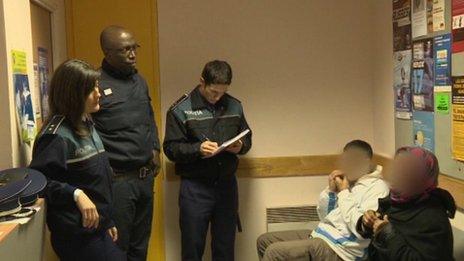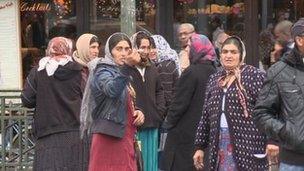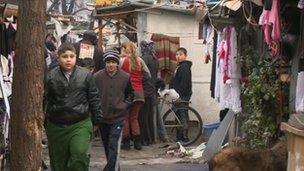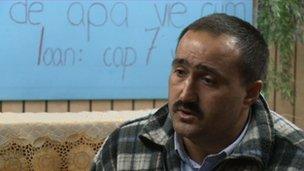French crack down on Roma gangs
- Published

French and Romanian police work together to combat teams of pickpockets in Paris
On the platforms of the Gare du Nord in Paris, the French and Romanian police are now patrolling together.
It is election year in France and the long-running controversy surrounding Roma is exercising politicians again.
There is renewed focus on law and order, centred on those responsible for a disproportionate level of crime.
Romanian officer Ana Grigore, dressed in her own national uniform, says the intelligence they are sharing is producing important results:
"Sometimes the people [we arrest] are already subject to international search warrants and are in the Schengen database. With the help of our French colleagues we catch them [interrogate them] and send them back to Romania."
Yet in the Gare du Nord, there are several teams of beggars and pickpockets working the concourse, most too young to be expelled. Their unscrupulous, invisible gang-masters who lurk nearby, know it.
Some of these children have been arrested a number of times and the authorities are powerless to act. It is the Fagin-like bosses they must catch.
Since last summer, the French government has been working with the Romanian authorities to repatriate thousands of Roma travellers.
In fact, research shows that most of those residing in France are from Romania - not Hungary, Poland, or the Czech Republic where there are sizeable Roma populations.
It is a country-specific problem.
Expulsion orders
Professor Tommaso Vitale from Sciences Po university and a specialist on Roma migration says you can also pinpoint which cities these people come from, which would suggest this problem could be better handled.
"This particular campaign [from 18 months ago] doesn't work," he says.
"We are talking about 15,000 people, a very small number of people. Albeit they are highly visible, identified constantly in the media. From that number maybe 2,000 - 2,300 maximum were sent home.

Foreign-born Roma are often seen begging on French streets
"They were happy to take the 200 euros they were given to return. It was used to go home on holiday - the evidence suggests most came straight back to France."
There are hundreds of Roma who have been handed expulsion orders that run out this week.
And in the past few months the Interior Minister, Claude Gueant, has been stepping up his campaign to remove them from highly visible areas. He has banned begging on the Champs Elysees and the more popular tourist spots of Paris.
Children 'exploited'
In press conferences he cites the government's statistics that would attribute 10% of all crime in France to the Roma - half of which, he says, is down to children.
"It is a cruel, unacceptable situation," said Mr Gueant. "These children are exploited by mafia bosses who draw them into delinquency and slavery. That cannot be allowed to continue."
Most of the 15,000 Roma residing in France live in makeshift camps on land that has been abandoned or forgotten by the local authorities.
In the northern suburb of Seine-Saint-Denis there is one such camp hidden between a network of busy motorways, home to 300 travellers. It's a patchwork of wood and corrugated iron huts, exclusively Romanian. Half the inhabitants are children.
There's no sanitation - they wash in a nearby cemetery - and despite the concerted efforts of the Roma and local charities, only three children have ever been accepted into nearby schools. All have since been excluded without explanation.

None of the estimated 150 Roma children living in this camp attend school
The camp leader Ioan, who invited me into a makeshift church they have built in the heart of the camp, said they can't find legitimate work and they have no access to even the most basic social services.
"It's winter and it's too cold to be without a home," he said. "When the authorities come, we will beg them for another place to stay - even if we have to pay for it.
"140 people were expelled from the camp last year and then returned."
We talked in the brightly decorated altar of the church. The lightbulbs flickered as the rain bounced off the corrugated iron roof. The camp has one generator which is used sparingly.
In theory, many of these people will be out in the cold in just a few days' time. Last month they were served with expulsion orders for 6 January and the police have promised to return.
"If I am expelled, I will definitely return to France. I have been here for 10 years. We are so poor, and there is no work for us in Romania. We have to come back. What other choice do we have?"
Manola Bogdan, from the charity Medecins du Monde said: "The police come at 7 AM. They ask the people in the camp to come outside. Then, at 12 PM, they begin to give the expulsion orders. Why do they have to wait for 5 hours before giving this order?
"Next, the CRS [riot police] come and they are much more brutal. They destroy everything: the huts, perhaps even this church."
The resurgent Front National, a big threat to the French president in this election, is opposed to the freedom of movement within the European Union enshrined by the Schengen agreement.
In Toulon last month, President Sarkozy said he wanted Schengen reformed.
"We cannot sustain unlimited social immigration," he said.
Prof Vitale told me that for the moment it's the economy that dominates the political agenda but as the campaign hots up, the president will come under pressure on law and order, and the debate will be dominated by the far right.

Ioan says if he and his family are returned to Romania head back to Paris right away
"He [the president] wants to show he can control the eastern border," said Prof Vitale. "The Front National are looking and campaigning on this issue. And it could be very dangerous for the Roma."
The charities operating in Ioan's camp warn the Roma are living in greater poverty and in even greater fear and intimidation than they were before this campaign began.
Ioan told me that if he is repatriated this month he and his family will begin their return to France as soon as they reach Bucharest.
It is a cruel, vicious circle. One that enslaves and imperils the most vulnerable: the youngest children, whom the politicians would claim to be helping.
- Published27 January 2011
- Published19 October 2010
- Published19 October 2010
- Published1 October 2010